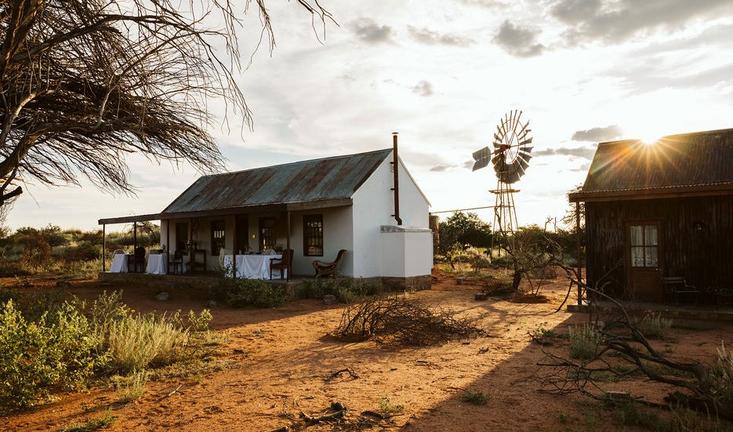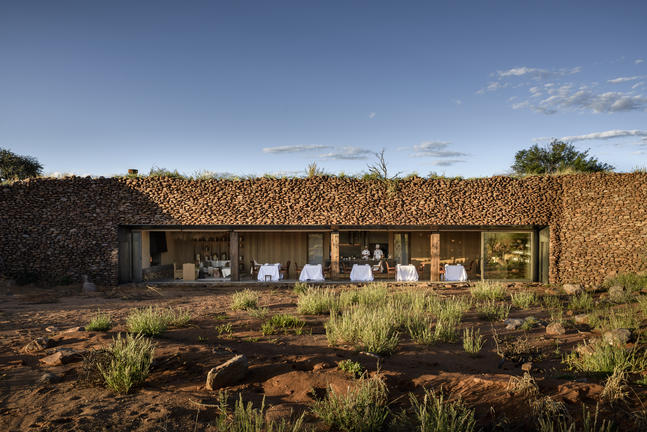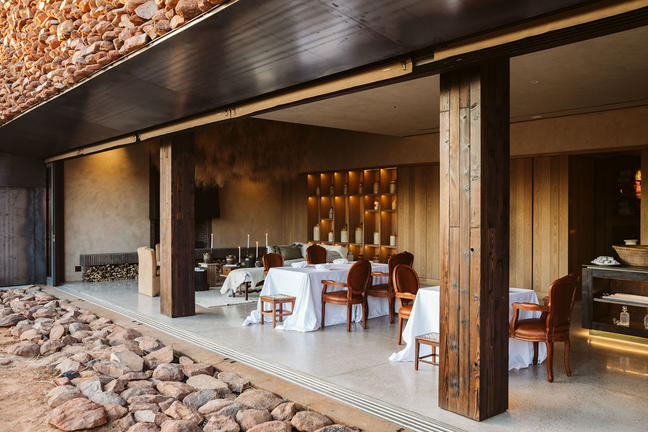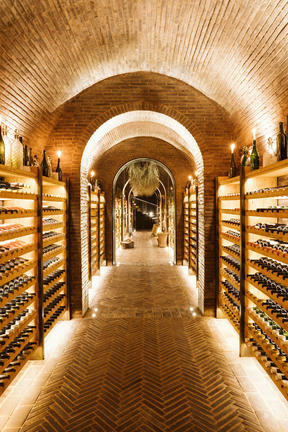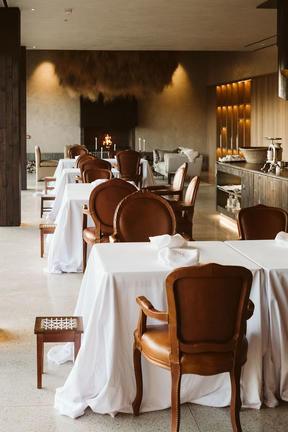- Info
- Images
- Rooms
- Facilities
- Activities and Services
- Restaurants
Motse lies in the west of the vast Tswalu private reserve where the ancient Korannaberg mountains give way to grassy plains and red dunes dotted with natural pans attracting varied wildlife. In design, the camp echoes the southern Kalahari’s dramatic beauty with earthy materials, organic shapes, richly textured interiors and nature-inspired tones. There are nine guest suites, or legae (a Setswana word meaning ‘home’), each a private sanctuary set in gardens landscaped with indigenous southern Kalahari trees and plants. Motse welcomes children of all ages, and families are accommodated in three family legae, or suites, with two en suite bedrooms sharing a central living area and verandah. Amenities include indoor-outdoor dining, a spa, gym, boutique and photographic studio.
Between game drives, walks, horse riding, meerkat encounters, and more, the camp’s nine spacious legae (a Setswana word meaning ‘home’) are private sanctuaries to retreat to, offering every imaginable creature comfort. Dining is a highlight, from picnic breakfasts, poolside lunches and lantern-lit dune dinners under the stars to Boscia House Pop-up, an exclusive, provenance-led culinary journey included in stays of two nights or more.
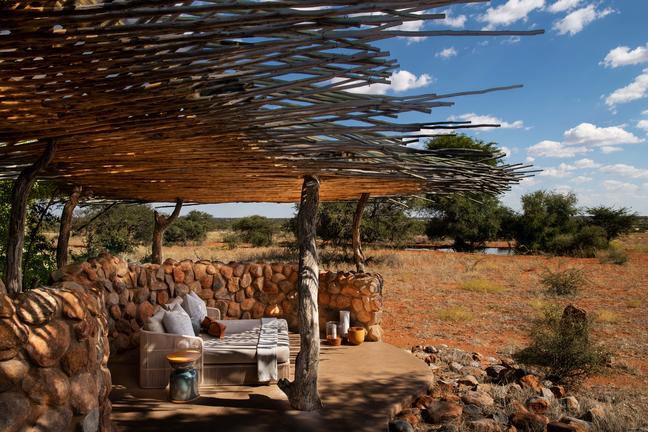
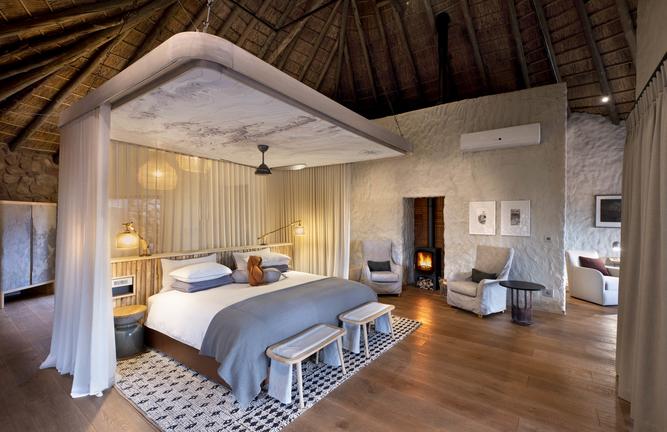
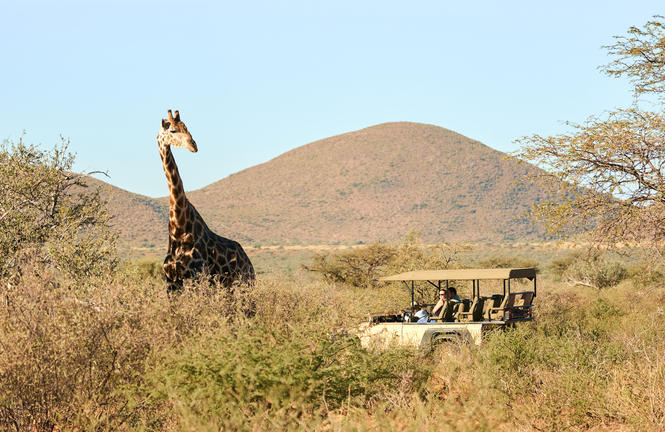
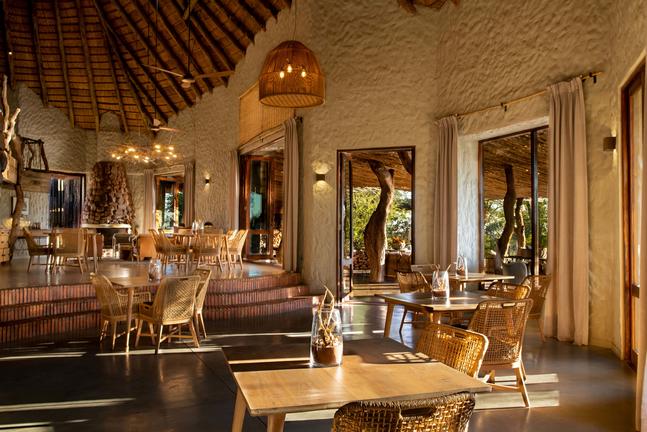
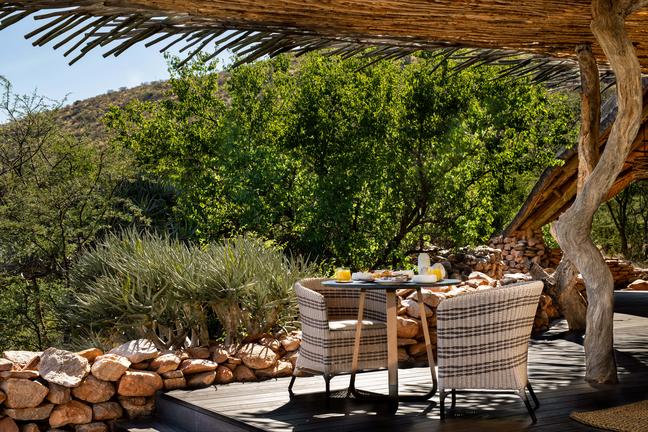
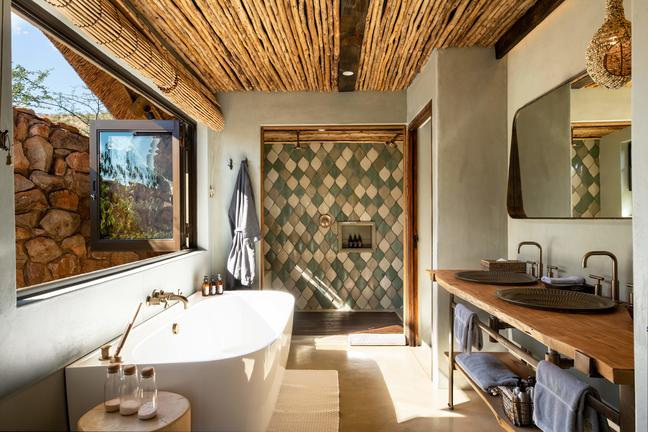
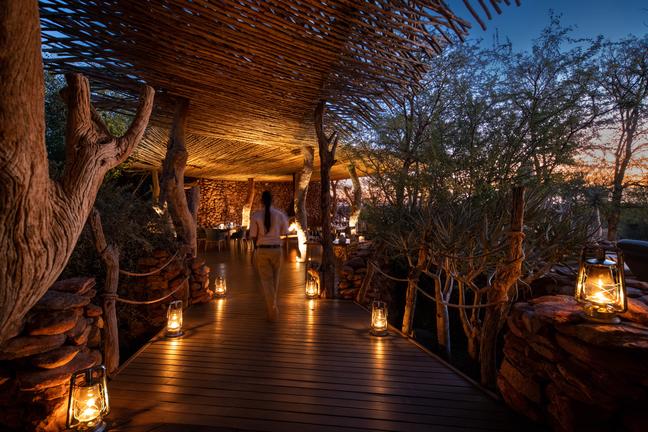
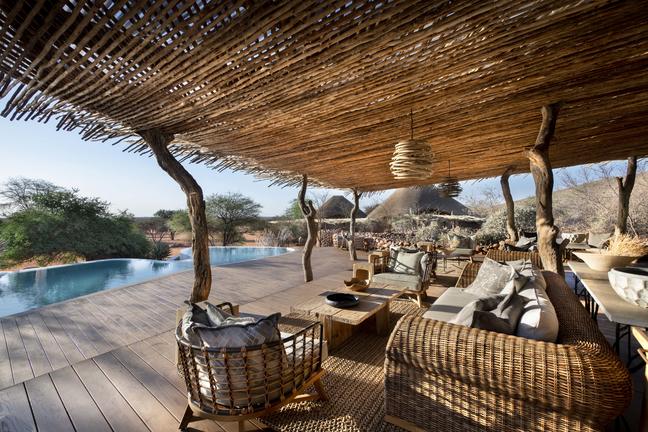
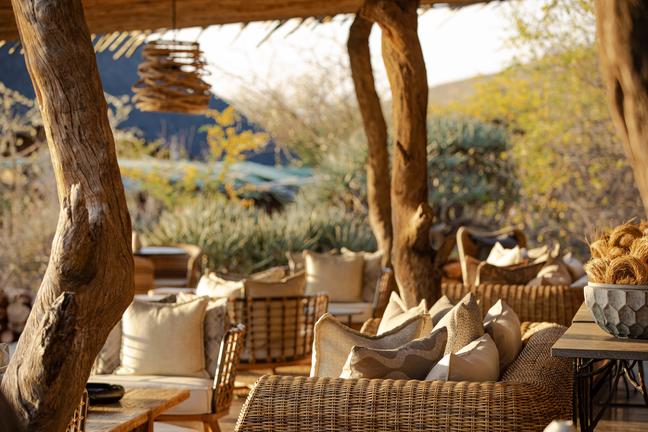
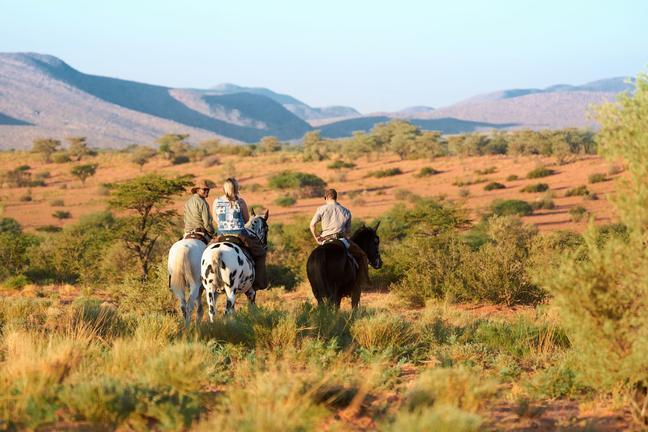
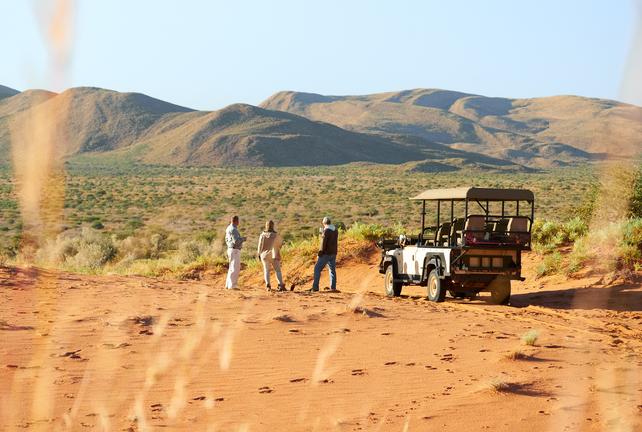
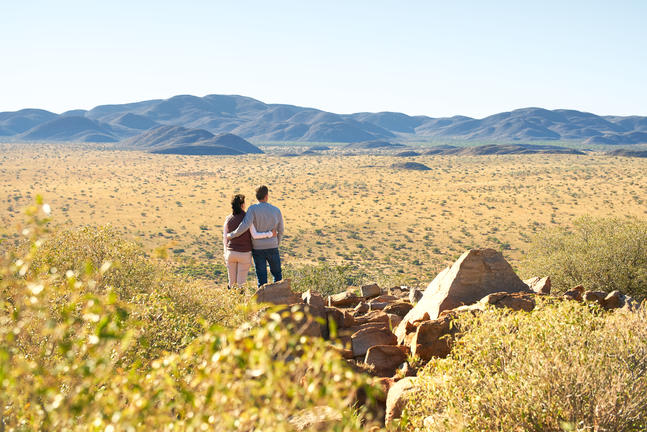
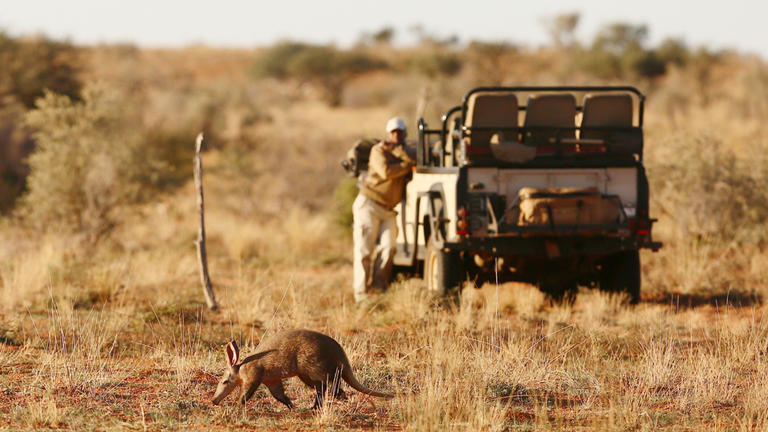
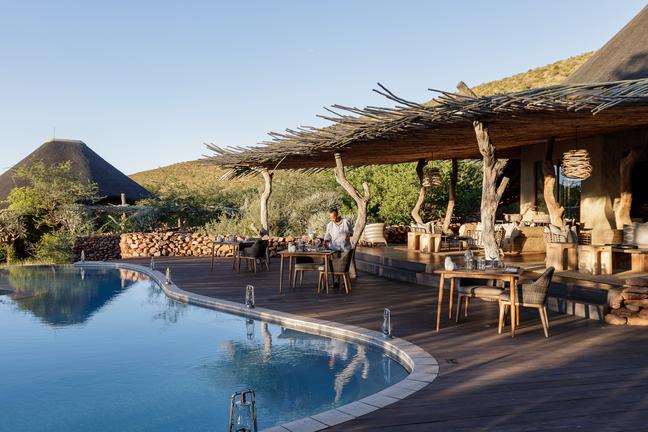
A ‘village’ of just nine houses (three of which feature a second bedroom for children), The Motse captures the soul of the Kalahari in its design and materials. Private spaces flow effortlessly into waterhole views and beyond to the savannah.
The architecture of The Motse aligns beautifully with Nature to create moments of warmth and coolness, seclusion and shared memories. Bedrooms are illuminated by the sun rising over the ridge behind The Motse, and indigenous trees create pools of shadow. Each space at The Motse invites you in, just as Tswalu beckons you to explore and investigate your surroundings.



Luxury is a given when you are on safari at Tswalu. At The Motse, just 18 adults are accommodated in nine individual legae (suites) made from desert sand, rock and thatch, with every comfort imaginable – open fireplaces, outdoor showers, private sun decks, spacious living areas, separate dressing and study areas and wireless internet.
We have three family legae (suites) which have 2 en-suite bedrooms separated by a large lounge and deck.
At the main lodge elevated decks around the freeform pool, allow panoramic views of the surrounding Kalahari landscapes, and a waterhole popular with wildlife. A spacious lounge and dining area, library, spa, fully-equipped gym, impressive wine cellar and traditional boma complete the luxury facilities.
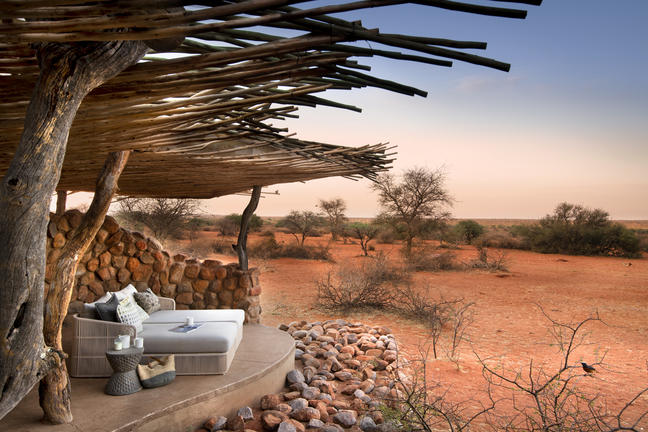
Property Facilities
Accept Credit Cards, Air conditioner, Baby Sitting, Bar, Children Friendly, Credit Card Facilities, Eco Friendly, Gym / Fitness Centre, Gym on property, Internet Access (Complimentary), Kiddies Club, Laundry Service, Library, Malaria Free, Meal On Request, Mobile Connectivity, Outdoor Pool / Pool Deck, Pool, Power Generator , Restaurant, Room Service, Spa, Vegetarian
Room Facilities
Air Conditioning, Balcony / Deck, Bath, Complimentary Wi-Fi, Disabled Rooms, Dressing Gowns, Fan, Fireplace, Fridge, Heated Towel Rails, Internet Access (Complimentary), Laundry Service (Available), Laundry Service (Complimentary), Lounge Area, Lounge, Mini Bar (Complimentary), Mini Bar, Mosquito Nets, Mosquito Netting, Outside Shower, Pure Cotton Linen, Safe, Sala, Shower, Tea / Coffee, Verandah
Available Services
24-hour Security, Disability, Laundry Service (Complimentary), Private Vehicle (Available), Room Service
Activities on Site
Bird Watching, Game Drives, Game Viewing, Game Walks, Gourmet Picnic, Helicopter Scenic Flights, High Tea, Horse Riding, Massages, Night Drives, Safaris, Sleep Outs, Walks (Guided)
Activities Nearby
Bird Watching, Game Drives, Game Viewing, Game Walks, Horse Riding, Safaris
With your own dedicated guide and vehicle, you can experience Tswalu exactly the way you want to. There are no fixed schedules or time limits at special sightings – during your stay, the dunes and grasslands are yours to explore the way you want to, and each wildlife encounter can unfold at its own pace.
Just like the sands of the Kalahari, we understand that your priorities can shift during your time at Tswalu. That’s why we’ll never try and shoehorn your experience into a fixed schedule.
Tswalu is unquestionably one of the best places in southern Africa to see cheetah in the wild – the vast open spaces and antelope herds of the Kalahari readily lend themselves to high-speed pursuits. Visiting Tswalu also gives you front-row seats for sightings of species that prove elusive elsewhere, from aardvark and pangolin to Hartmann’s Mountain Zebra.
Tswalu’s ecotourism ventures have a notably low ecological impact while also contributing significantly to the sustainability of the reserve and its achievement of its conservation and community upliftment goals. By remaining honest to our guiding principles, we can deliver a safari experience of startling authenticity.
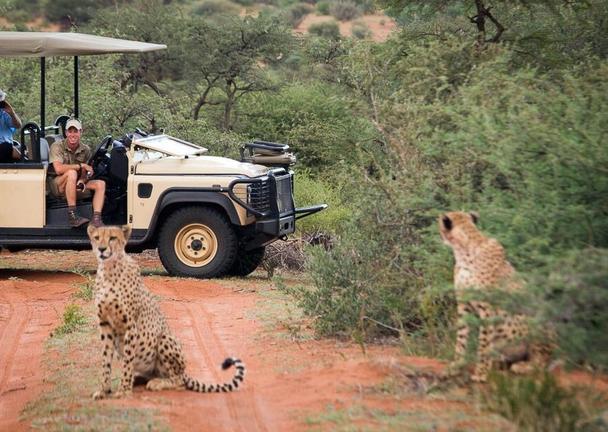
Much of Tswalu’s beauty can be found in the smaller details: the ripples left by the wind on the crest a sand dune, a yellow flower opening to face the sun, or the tracks of a porcupine digging for roots. Walking at Tswalu gives you the opportunity to see these and other signs of the abundance of the southern Kalahari, as well as following the tracks of larger species.

Another exciting game viewing option at Tswalu is a horseback ride
Horseback safaris allow guests to explore the dunes and savannahs on our well-schooled and well-mannered horses, which are suitable for all ages and all levels of experience.
There is no better way to get close to nature and the wildlife. On a horse safari in at Tswalu, you become part of the landscape and many of the animals react differently to your presence. No-one who experiences this kind of closeness with wildlife ever forgets it.
Our equestrian guides are well trained in the Kalahari ecology, and will lead you on a true safari where you can ride alongside antelope, buffalo, zebra and giraffe, or watch them from a distance without detection.
Children are welcome on horseback safaris. Both trail and English saddles are available and every piece of necessary equipment is provided, in every imaginable size.

Children are welcome at Tswalu and the reserve is well equipped to cater for them. Tswalu believes that they too can be part of the conservation vision.
The youngsters will be introduced to the Junior Ranger programme and given a backpack with guides and tools to help them learn about the Kalahari. During their stay they will make their own bow and arrow for archery, learn how to identify spoor, and track game on foot.
In between game walks and drives there are activities at The Motse specially designed to occupy the kids while mom and dad relax. Tswalu’s stables will create a special “pony camp” for any child who shares their passion for horses. There is no malaria in this part of the Kalahari and the pool is a big attraction. They can chat to the rangers, decorate cup cakes and even cook their own bush dinner in the special children’s boma. A separate children’s menu caters for their individual tastes.
Babysitters can be arranged for younger children if parents want time alone.

The Spa and Gym at The Motse provide both relaxation and stimulation for body and mind, with inspiration coming from the savannah views and the use of organic materials both in the construction of this space, and in the spa treatments.

Join a group of habituated meerkats as they emerge from their burrows and warm themselves in the rising sun or meet up with them as they return home at the end of the day and groom and play at dusk.
Their gregarious nature and amusing antics (think early morning sunbathing and playing chicken with scorpions) have made meerkats extremely popular as subjects of wildlife documentaries. Our two habituated colonies have accepted the presence of humans without letting it disrupt the important business of grooming and foraging.
Meerkats are just one of the smaller predators which abound at Tswalu: aardwolf, African wild cat and caracal are also frequently seen.

Join your guide in trying to puzzle out the hidden meanings in millennia-old rock engravings of animals, birds and abstract shapes. Today, no one knows whether they were created as memories, prayers or maps, but their beauty and mystery endure.

Every moment of every meal at Tswalu reflects the culinary heritage of South Africa and is carefully designed to be as inclusive as possible. Sustainability is key: we forage for Kalahari ingredients and work with local suppliers who share our low-impact ethos.
We believe that luxury is found in contextual, relevant flavours rather than wasteful over-abundance. Our food offering helps tell the story of Tswalu – it’s inspired by and captures the essence of the Kalahari.
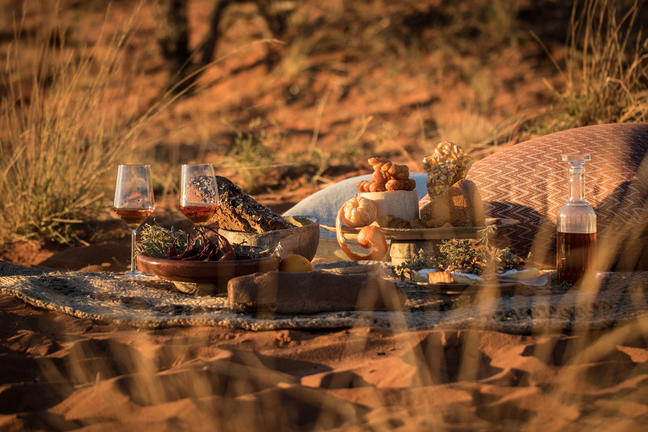
The Tswalu Foundation exists primarily to support ecological research at Tswalu. Through accumulating a growing body of quality output on the fauna, flora and the unique habitat of the southern Kalahari we have been able to make informed conservation management decisions to better support our shared vision.
This information has been made freely available to our neighbours and other interested parties so that, as we seek to add to our shared understanding of this rich and diverse landscape, they too can care for their land in the best long-term interests of the wildlife and people of the Kalahari.
During your stay at Tswalu, you’ll have the opportunity to interact with researchers studying both iconic and more obscure species and witness scientific conservation in progress.

A balmy summer night is a perfect time to sleep under the stars in the middle of the Kalahari. The Malori is Tswalu’s under canvas experience with comfortable beds, an open-air bathroom and a spacious deck area for dining, dreaming and stargazing. ?
?
?Whether reserved for romance or for family bonding time, a Malori sleep-out is about tuning out so that you can soak up the solitude, tune into the silence and count shooting stars.? With comfortable beds, an open-air bathroom and a spacious deck area for dining, dreaming and stargazing, the tent is perfect for two but spacious enough to invite the family. The Malori sleep-out is one of those once-in-a-lifetime experiences you will never forget.?
A night at Malori needs to be booked in advance, carries an additional cost, and is offered subject to availability and prevailing weather conditions.

From a late breakfast at the pool, a picnic in the dunes, a feast in the boma, or sundowners and snacks on your private deck... guests will delight in the delicious gourmet meals prepared by Executive Chef Marnus Scholly.
Every moment of every meal at Tswalu reflects the culinary heritage of South Africa and is carefully designed to be as inclusive as possible. Sustainability is key: we forage for Kalahari ingredients and work with local suppliers who share our low-impact ethos.
We believe that luxury is found in contextual, relevant flavours rather than wasteful over-abundance. Our food offering helps tell the story of Tswalu – it’s inspired by and captures the essence of the Kalahari.
Working in partnership with Michelin-starred South African chef Jan Hendrik van der Westhuizen, our chefs look to reinterpret the flavours they find around them and create unique taste touchpoints at every turn. Our choice of ingredients is only half the story; the context from which they come and in which they are served completes the picture.
Tswalu offers a number of dining options for guests who can dine indoors or out, in the dining room or at the pool deck, and can enjoy their meals at times that suit them.
Tswalu's wine list has been carefully selected from the best South African wines available and guests will enjoy the food and wine pairing menus.
All guests now have the once in a lifetime opportunity to experience Restaurant Klein JAN.
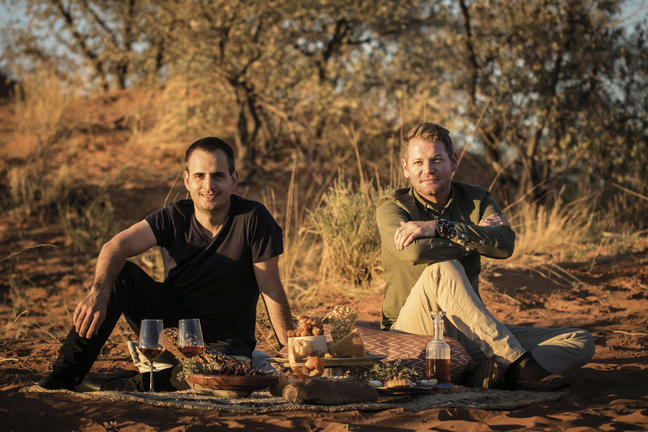
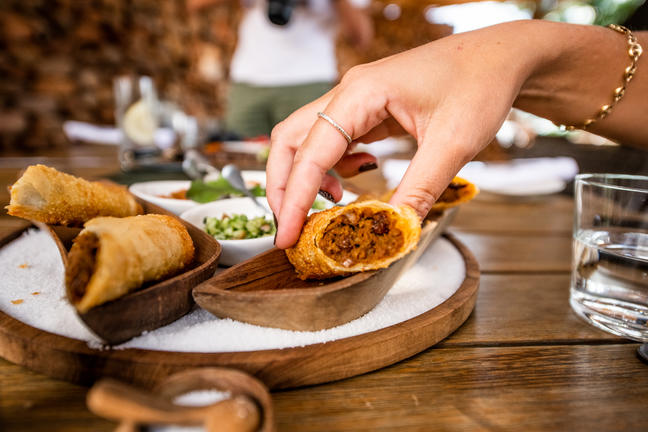


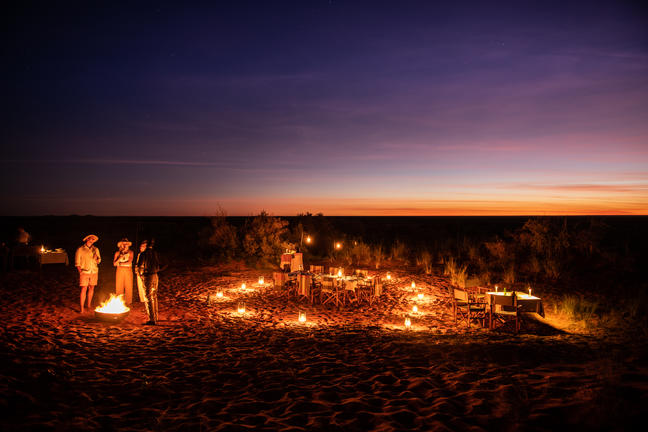
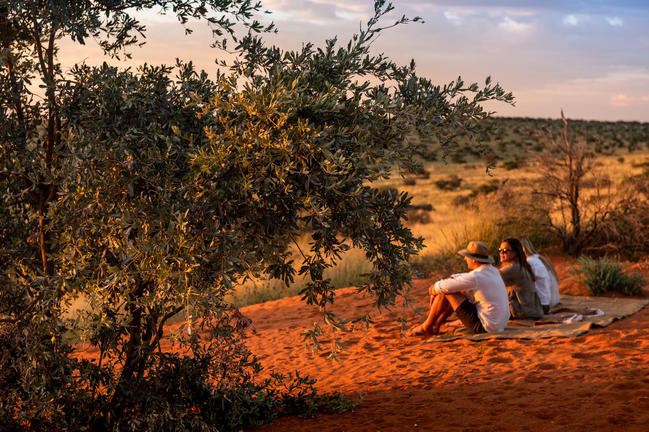
The opening of Klein JAN restaurant at Tswalu is the culmination of nearly three years of research by South African-born chef, Jan Hendrik van der Westhuizen, into the culinary traditions and ingredients of the cultures and communities that call the Kalahari home. Creating Klein JAN has been Jan Hendrik’s great homecoming project.
His vision? To tell the stories of the Northern Cape region on every plate - stories rooted in the ancient wisdom of this remote, off-the-radar place of extremes and dramatic, vast landscapes. It is a region of South Africa where life is determined or measured by the absence or presence of rain, where resources in a year of plenty are carefully stored or preserved for leaner times.
Jan Hendrik felt an instant connection to the vastness of the Kalahari, and knew that the time had come to elevate the unsung heroes of the Northern Cape and their superior produce and products to their rightful place. Opening Klein JAN at Tswalu, rather than in South Africa’s foodie capital of Cape Town, added authenticity and sustainability clout to the venture, echoing the importance of local expression, provenance and procurement that Jan and his team have nurtured at Restaurant JAN in Nice, France, since it opened in 2013
